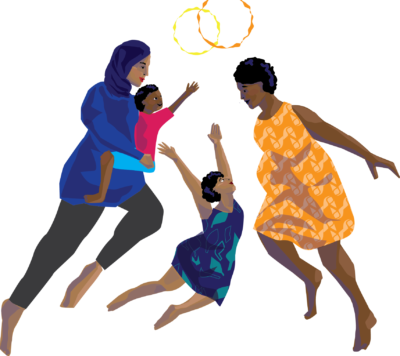Our Vision

Current State of Play
Reproductive rights for women and sexual and reproductive health care for LGBTQ people have come under repeated and worsening attack in the ideological war on our bodies. But these rights and services are neither optional nor incidental to our survival. They are essential aspects of health care that can dramatically affect our lives. Ideologically driven policies and funding shifts designed to control or restrict sexual and reproductive agency especially impact low-income women, women of color, immigrants and those who are undocumented by minimizing decision-making power, creating opportunities for discrimination and limiting access to necessary health care services and skilled providers. Further, women living with HIV and women of trans experience of any HIV status continue to face persistent HIV-related and gender-based stigma and discrimination from providers. Thus, compounding oppressions exacerbated by the administration’s economic, environmental, immigration and criminal justice policies have intensified the fight for reproductive justice and the need for truly intersectional advocacy.
The ability to exercise our reproductive rights, including creating families of our choice, should never be limited by ability to pay, gender expression, gender identity, HIV status, immigration status or race. Low-income women’s reproductive autonomy should not be restricted by the State because they rely on Medicaid or another public payer. Everyone, including undocumented minors, should have access to safe, legal and affordable abortion and contraception, and all people of all ages and genders should receive medically accurate information to make informed choices about their health.
Thus, in this moment and beyond, PWN-USA’s agenda seeks to advance policies that would uphold the full spectrum of sexual and reproductive health and rights (SRHR) for people living with HIV of all ages and gender experiences. This includes access to non-stigmatizing care that affirms the right to enjoy sexual intimacy, and to choose if, when and how to have a family, free from coercion, violence, poverty and other forms of reproductive oppression.
At the federal level, we support:
At the federal level, we oppose:
At the state level, we support:
At the state level, we oppose:
Resources
- Reproductive Justice
- National LGBTQ Task Force – Queering Reproductive Justice
- PWN-USA Reproductive Justice Fact Sheet
- Bodily Autonomy: A Framework to Guide Our Future, March 2017
- Title X Family Planning Program
- National Family Planning & Reproductive Health Association – Title X Fact Sheet, November 2017
- US Abortion Policies
- Guttmacher Institute – An Overview of Abortion Laws, March 2018
- Planned Parenthood Action Fund – 20-week Bans
- Contraceptive Access and Coverage
- Free the Pill Project (Over the Counter Oral Contraceptives) – Resources
- In Our Own Voice: National Black Women’s Reproductive Justice Agenda – Contraceptive Equity Fact Sheet
- Negative Birth Outcomes
- National Advocates for Pregnant Women – Punishment of Pregnant Women
- SIA Legal Team – Roe’s Unfinished Promise: Decriminalizing Abortion Once and for All
Take Action!
- Urge your legislators to support the rights and the sexual and reproductive health decision making power of low-income women by removing the federal ban on abortion funding.
- Demand your federal and state legislators protect access to safe, legal and affordable abortion care and expand access to comprehensive non-stigmatizing and gender affirming sexual and reproductive health care. Check out this tool kit for local reproductive rights and justice advocacy and organizing.
- Advocate for the full integration of robust sexual and reproductive healthcare services though all parts of the Ryan White program
- Promote contraception equity at the state and local level by requesting your legislators introduce or support legislation that expands access to full scope of contraceptive methods regardless of gender identity
- Fight to repeal overly broad laws that criminalize people for negative birth outcomes or self-induced abortion.


